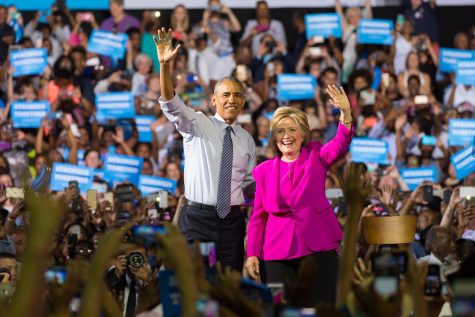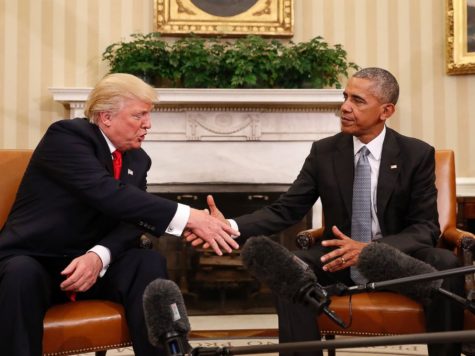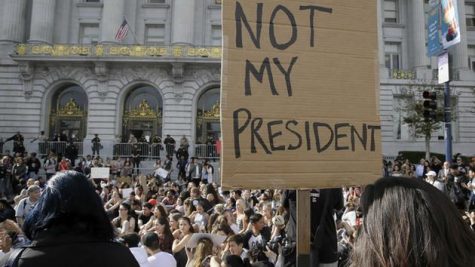All (Wo)men are Created Equal
In consideration of Women’s History Month, it is important to acknowledge that women’s rights in the United States have improved and continue improving with time. I often hear people in my daily life saying that things are getting better for women, including the improved positions of female government officials. Though there is indisputable truth to this statement, there is still a need for further reformations in political gender equality. Women are significantly underrepresented in politics. I asked Ms. Basch, who teaches Economics and AP Government and Politics at SHC, for her thoughts on the topic of female representation in the U.S. government. As Ms. Basch informed me, women make up 50% of the U.S. population, yet constitute only 20% of its Congress. There are still many influential, powerful women that have risen to political authority, such as Hillary Clinton, Michelle Bachmann, Nancy Pelosi, and Dianne Feinstein, to name a few. However, when women advance in politics and gain authoritative positions, they are often torn down and criticized based on petty characteristics, such as their physical appearance, and therefore are not taken seriously or shown the respect they deserve. Two dynamic female politicians who were particularly degraded and disrespected in the 2008 presidential election, despite their multitude of accomplishments, include Hillary Clinton and Sarah Palin. These two females embodied womanhood in different ways and were thus confined to the two most basic stereotypes of women: the Heartless Harpy and the Brainless Beauty Queen.
Despite Clinton’s remarkable credentials, she faced undeniable sexism and criticism throughout her presidential candidacy. She was castigated for her stoic demeanor, which some people view as being callous and apathetic. Clinton has proven that she is entirely capable of taking on governmental responsibilities, given the fact that she was the first woman to win a state primary in a presidential election, or multiple state primaries in her case. She also served as a U.S. Senator and was U.S. Secretary of State in the Obama Administration. However, the media diminished her accomplishments by portraying her as a “she-devil”, as stated by Bonnie Erbe writing for U.S. News and World Report. Bonnie Erbe also mentioned that newscaster Mike Barnicle related Clinton to, “looking like everyone’s first wife standing outside a probate court”. These misogynistic and sexist portrayals of Clinton have also recently come into play in light of recent talk about her potentially running for office. In order for Americans to take Clinton into serious consideration as a future president, it is crucial that media and the general public terminate the sexist profiling of Hillary Clinton, and instead appreciate her governmental experience and authority.
In contrast to Clinton, Palin portrayed herself in a hyper-feminine way, causing people to view her as weak, and therefore incapable of fulfilling vice-presidential duties. She was regarded very provocatively during the presidential election of 2008. For example, as indicated by the documentary Miss Representation, while Palin delivered a speech, there were pictures shot between her legs. This incident exemplifies how the substance of Palin’s speech, along with her profound accomplishments, were overlooked as people degraded her by focusing solely on her physique. One of Palin’s most prominent achievements was the fact that she was the first female vice-presidential candidate on a Republican ticket. Nonetheless, Sarah Palin was viewed merely as McCain’s attractive accessory, thus stripping her of her power, authority, and respect. Due to this misguided perception, Palin was also regarded as unintelligent, and therefore not adequately qualified to fulfill vice-presidential duties, again belittling her impressive accomplishments. Sadly, degradation such as this is an issue that many charismatic, brilliant female politicians have endured throughout governmental history.
Women in government deserve more respect, acknowledgement, and representation than they receive. It is time for society to eradicate the diminishment of women’s achievements and the unjust misogynistic profiling of female government officials. Women make many meaningful contributions to government, and they offer important insights different than those of men. As Ms. Basch stated, women “may provide a space that is less hierarchical and more open to hearing out and encouraging the greatest talents of all at the table, rather than simply ordering others around”. Therefore, it would be remarkably beneficial to society to have more female leaders worldwide. In order to promote the empowerment and growth of female politicians, as Ms. Basch declared, we must advance education for future generations of women and publicly advocate support and appreciation for female political figures. There is hope for positive transformation in the representation and recognition of women in government, and we must stand united to achieve it.




